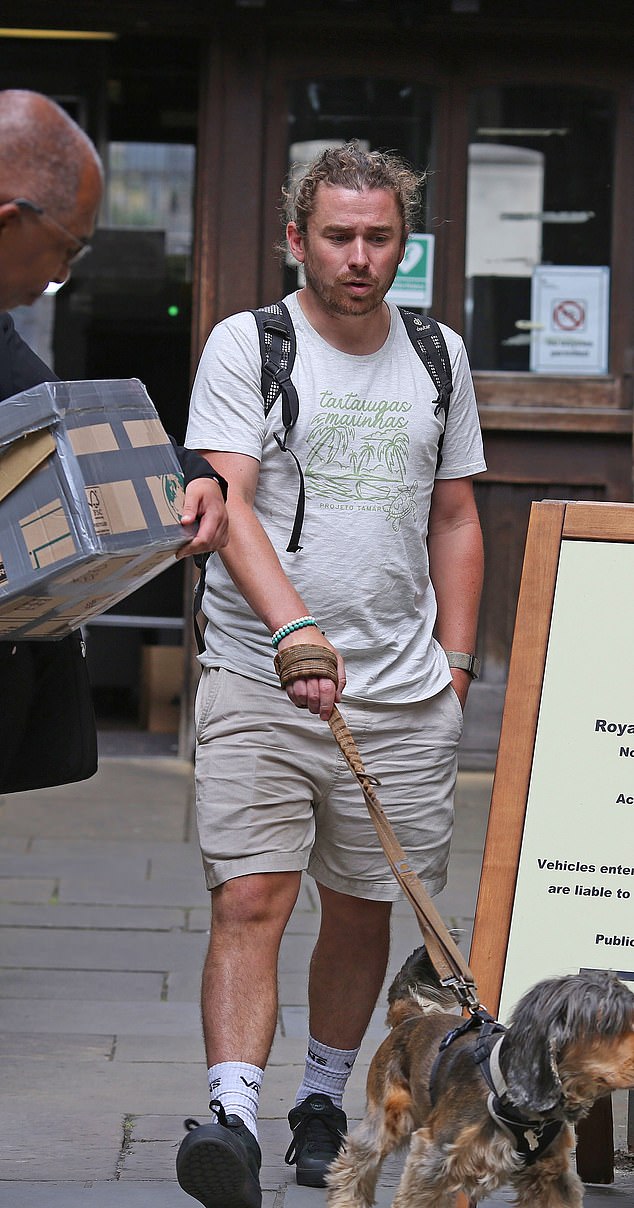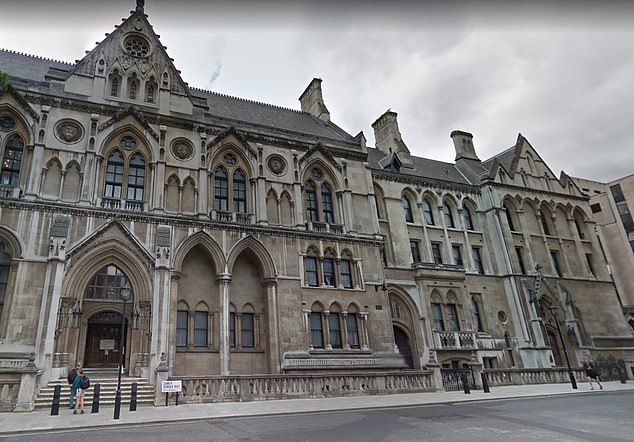A Tour de France hopeful is suing a motorist for £1million, claiming his pro cycling career dreams were dashed when a car passenger opened her door as he rode past.
‘Supremely fit’ James McLaughlin smashed his shoulder and right elbow when a door was opened as he rode along a cycle lane in West Wickham, southeast London, in May 2020.
The 34-year-old rode for a series of professional teams and represented Guernsey in the Commonwealth Games in 2014 and 2018, with aspirations of competing in the Tour de France.
He says the accident has left him with brain damage, which in turn has led to depression, memory loss, fatigue, and PTSD, leaving him reliant on an emotional support dog.
The racer, who is suing both the motorist and the passenger for over £1million in compensation, was taking a short break from his cycling career and working as a courier at the time of the incident, Central London County Court heard.
And although motor insurers have admitted liability for the incident, they are disputing whether Mr McLaughlin did in fact suffer a brain injury, as well as his compensation claim amount.
Representing the veteran rider, barrister Winston Hunter KC, conceded Mr McLaughlin had suffered other road falls in his career before the 2020 incident, but said there was no evidence that any of these accidents caused him lasting problems.
At the time of his crash, Mr McLaughlin was taking a pause from the pro circuit, but was ‘supremely fit’ and had clocked up a number of recent successes, including coming sixth in the time trial at the 2018 Commonwealth Games despite injury.

‘Supremely fit’ James McLaughlin (pictured) is suing a motorist and passenger for £1million after they opened a door in a cycle lane

The former pro-cyclist, who previously competed in the Commonwealth Games, claims he has been left with brain damage from the incident
The rider would have slotted back into the world of top cycling if it weren’t for the accident, his barrister said, detailing how it has plagued Mr McLaughlin with poor concentration, memory, anxiety and distress.
It was also heard a neuropsychologist who examined him considered he had suffered concussion due to his head being ‘shaken around’ in the crash.
However, Lionel Stride – representing the insurers – challenged the existence of a ‘mild traumatic brain injury’, saying there was no mention of Mr McLaughlin suffering a blow to the head at the time of the accident.
‘He came into contact with a car door at speed and was subsequently thrown off and hit the ground, with an orthopaedic injury to his right shoulder,’ he told Judge Jane Evans-Gordon. ‘There was no mention of a blow to his head.’
A pre-trial hearing was held over whether Mr McLaughlin should be allowed to rely on further medical evidence from neurologists focusing on whether concussion and a ‘minor traumatic brain injury’ could be the root cause of his current problems.
However when Mr McLaughlin arrived with his support dog Barley on a lead, he was told by the judge that his pet would have to be excluded as the rules normally only allow guide dogs inside.
‘If it’s an emotional support animal, they’re not normally allowed into court, not least because they’re not properly trained like guide dogs,’ she explained to the cyclist’s KC. ‘At least it’s a dog and not an exotic animal.’
Allowing in the new evidence, the judge said Mr McLaughlin came to grief ‘when a car door was opened across a bicycle lane in front of him’.

As such he says he now suffers from depression, memory loss, fatigue, and PTSD, leaving him reliant on an emotional support dog and wrecking his pro-cycling dreams
‘Apart from physical injuries primarily to his shoulder and elbow, the claimant has suffered with psychological problems following the accident,’ she said.
‘The psychological problems include PTSD, phobic anxiety and depression. Although he has undergone psychiatric treatment with an eminent psychiatrist, his symptoms have not improved as much as might have been hoped.’
She added that Mr McLaughlin is convinced he suffered a brain injury in the collision and ‘that this has an impact on his long-term employment prospects’.
On top of medical evidence, lawyers have also obtained reports from sports scientists about how Mr McLaughlin’s cycling career prospects were impacted by the incident, the court heard.
‘It appears to be common ground that the claimant was an elite cyclist and had the potential to be a high achiever in the event that he returned to the world of elite cycling,’ the judge noted.
‘If his psychological symptoms have a non-organic cause, then they are likely to resolve in due course,’ she said.

Motor insurers have challenged the existence of a ‘mild traumatic brain injury’, saying there was no mention of Mr McLaughlin suffering a blow to the head at the time of the accident (File image of London Central County Court)
However if the injuries were ‘organic’ such as a mild traumatic brain injury, they would not improve and ‘are likely to have a significant impact on his future earning potential.’
After hearing arguments from both sides, the judge agreed to admit the neurological evidence, which she said concerned a ‘very significant issue for him’.
‘It could make a difference of approaching £400,000 to his loss of earnings claim,’ she said.
A full trial of the claim was originally due to take place later this year, but that may now have to be delayed due to the new neurological reports.
‘Car dooring’ accidents occur when a driver or passenger of a vehicle opens its door into the path of a cyclist, giving them little or no opportunity to stop.
According to Cycling UK, at least 500 cyclists in Britain are known to be injured every year in dooring incidents, although the true number is thought to be much greater.












